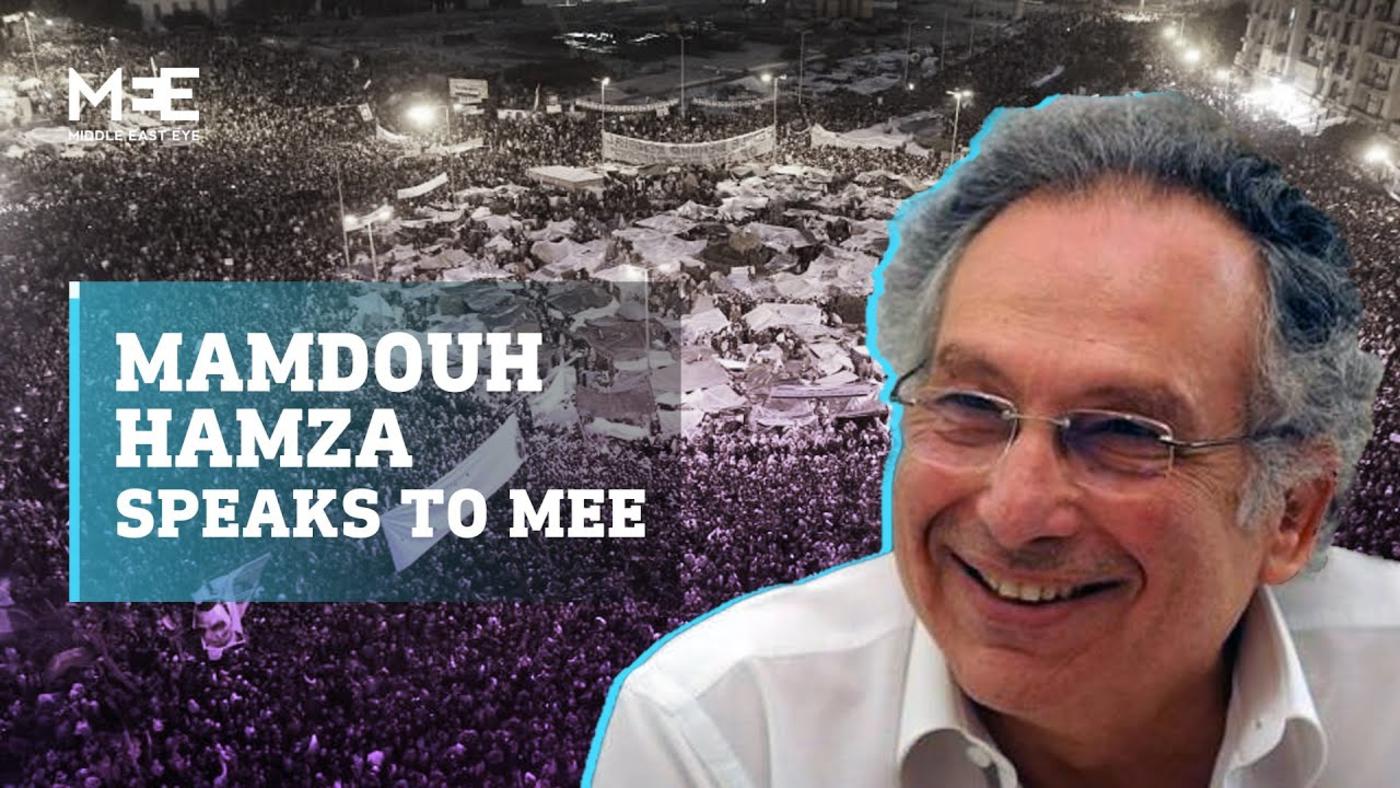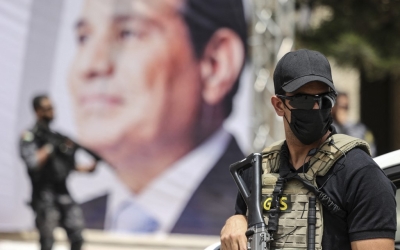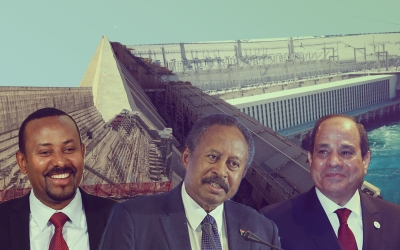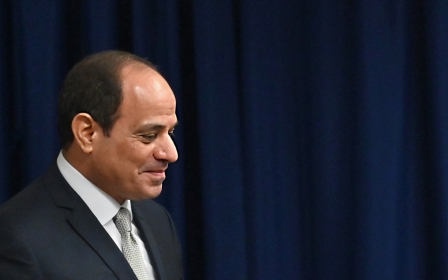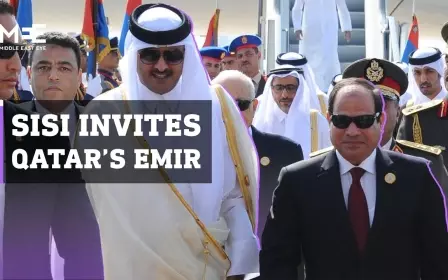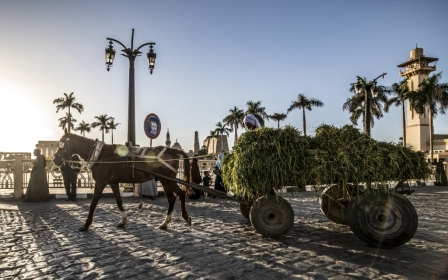Prominent former Sisi supporter predicts fresh Egyptian revolution
Abdel Fatah el-Sisi will be toppled by another popular revolt in Egypt because he has lost the support of his people, one of the president’s most vocal supporters, now turned critic in exile, told Middle East Eye (MEE).
Leftist campaigner Dr Mamdouh Hamza led demonstrations against Sisi’s predecessor Mohamed Morsi in 2013, supported the general’s subsequent presidency, and urged police and military to clear the anti-coup sit-in at Rabaa Square.
He also participated in the 2011 revolution that removed longtime autocrat Hosni Mubarak, and now predicts fresh upheaval will sweep the current regime from power.
“We went for the January [2011] revolution for a better living. I think the coming revolution will be for living. A big difference,” Hamza said.
'Sisi is not strong. He looks only strong, but he's on shaky ground. Any minute, any minute we can have a blow up'
- Mamdouh Hamza
In an interview with MEE, Hamza confidently declared that Sisi no longer enjoyed the support or the trust of the Egyptian people.
New MEE newsletter: Jerusalem Dispatch
Sign up to get the latest insights and analysis on Israel-Palestine, alongside Turkey Unpacked and other MEE newsletters
Asked what could topple Sisi from power at a time when his rule looks so secure and the political threat from the Muslim Brotherhood has been crushed, Hamza replied: “Sisi is not strong. He looks only strong, but he's on shaky ground. Any minute, any minute we can have a blow up.”
Although Sisi, backed by the army, has total control, Hamza said no dictatorship with an iron fist can continue because of the information available to all on mobile phones.
“People communicate with each other through social media. The people know the lies cannot go on forever. There will be change, within a year or two, maximum.”
Asked who would be the force behind such a regime change, Hamza said he was against military coups and assassinations.
“It has to be movement of the people, farmers who don't have water in the land. People in schools who cannot teach anymore, no classrooms. Parents who think that the children are not educated. Families who cannot treat health-wise their members. Huge loans which are very badly spent,” he said.
Hamza said Sisi’s biggest problem was public opinion in Egypt.
“First of all, he said he did not want to be president. Then he nominated himself. He said: ‘I will not cut subsidies before I put money in your pocket’. He didn't. He told the people the Suez Canal will repay the money spent on it; Suez Canal is losing money since the new branch was built,” Hamza said.
“He builds roads, costing a lot of money, with no traffic on them. The people know that. He builds bridges triple the size of what is needed. The people know that. He went and knocked down homes suddenly. The people know that. People know the houses of parliament are engineered by the security parliament. This is a real problem to Sisi: the people.”
'I was never pro-coup'
As an engineer of international repute specialising in soil science, Hamza has taken part in major construction projects, including the Library of Alexandria. He owned a well-known construction and consultancy company, Hamza and Co., whose assets have been seized by the state.
Politically active since his election as head of Cairo University’s student union in 1976 during the presidency of Anwar Sadat, Hamza was a prominent figure at Tahrir Square in 2011.
When Morsi, Egypt’s first democratically elected leader, issued a decree temporarily suspending the powers of the judiciary over his decisions, Hamza joined demonstrations against the president, calling for early elections.
Today he denies he ever supported a military coup against Morsi.
“I was never pro-coup d’etat or pro-Sisi," he said. "I was against a religious war.
"I was against political Islam. I don't believe either in the military or in religion. And Morsi did not help when he issued some sort of a law to protect his decisions. That was horrible.”
However, once Sisi was installed as president, Hamza supported the man who overthrew Morsi, sending him proposals for 26 different construction projects, none of which were commissioned.
His break with Sisi’s government began when Hamza published an article criticising the decision to build a branch on one section of the Suez Canal, an $8.2bn megaproject that was supposed to double annual revenues to some $13.5bn by 2023.
Instead, canal revenues have dipped from $5.8bn in 2019 to $5.61bn in 2020, according to the canal authority.
Sisi raised $8.5bn after banks issued investment certificates to finance the project.
"What really made me change my mind was when I heard about the new Suez Canal. It’s a lie. There is nothing called the 'New Suez Canal'. I wrote an article saying this would be a disaster for Egypt and saying why we do not need this new branch. This was the turning point and I stopped appearing on the [state-run] media.”
GERD will be 'a disaster'
After campaigning against the surrender of two uninhabited islands in the Red Sea, Tiran and Sanafir, to the Saudis, Hamza turned his attention to the second national disaster he identified: Sisi’s handling of the Grand Ethiopian Renaissance Dam (GERD) on the Blue Nile.
Hamza predicted that disaster would strike Egypt by 2023 if Ethiopia’s filling of the GERD went ahead as scheduled.
He warned that up to 40 percent of the Egyptian population could be put out of work by reduced water levels and hunger, calling the situation an international emergency that was the responsibility of the whole world.
He said Sisi should void the agreement he made over the dam in 2015 with Ethiopia and Sudan, and revert back to the 1902 pact made by the British with Addis Ababa in colonial times when it was agreed that no dams should be built on the Nile.
Hamza said Egypt should offer to fund cheaper forms of electricity than hydroelectric power, such as solar energy and wind turbines, which could be produced locally and did not require costly transmission lines.
The engineer offered the example of Kenya as a place where dams caused carnage downstream.
Kenya’s Lake Turkana, the world’s biggest desert lake, is suffering from dwindling fish stocks after Ethiopia’s construction of a hydroelectric dam on the River Omo.
The US Department of Agriculture confirmed that the lake’s water level dropped 363 meters in 2016 when the turbines at Gibe 3 opened.
Water levels have since been swelled by unseasonably heavy rains, but fishermen fear that is temporary, Reuters reported.
“Abiy Ahmed [the Ethiopian prime minister] has already said that the Blue Nile will be an Ethiopian lake. And one of their top journalists said ‘Egyptians, you will not a get drop of water in 20 years’. What do you think? Is that possible? Who will accept that? The Nile is the fabric of our civilisation. The Nile is the cement of our people,” Hamza said.
'I have published 64 papers of research, but I am a terrorist in the eyes of the Sisi regime'
- Mamdouh Hamza
Hamza said that if all else fails, Egypt should bomb the GERD.
“What did Mrs Thatcher do with Falklands? Either we have the example of Alaska, by agreement we will give them fuel, solar panels, and some wind turbines, or we do it Falklands style. There's no way. Anything else will be betraying the Egyptian people and Egyptian civilisation,” he said.
A few years ago, Hamza left Egypt for medical treatment. In absentia, three verdicts were issued by the court against him over allegations he incited violence against the security forces, and he was put on Egypt’s list of terrorists.
“You can see the fire coming out of my ears. I'm a terrorist. I'm 73 years old but suddenly become a terrorist. A professor of civil engineering, I graduated from Imperial College, London. I have published 64 papers of research, but I am a terrorist in the eyes of the Sisi regime. And he's using this law against anybody against him,” Hamza bemoaned.
“The real terrorist in Egypt is Sisi.”
Middle East Eye delivers independent and unrivalled coverage and analysis of the Middle East, North Africa and beyond. To learn more about republishing this content and the associated fees, please fill out this form. More about MEE can be found here.


